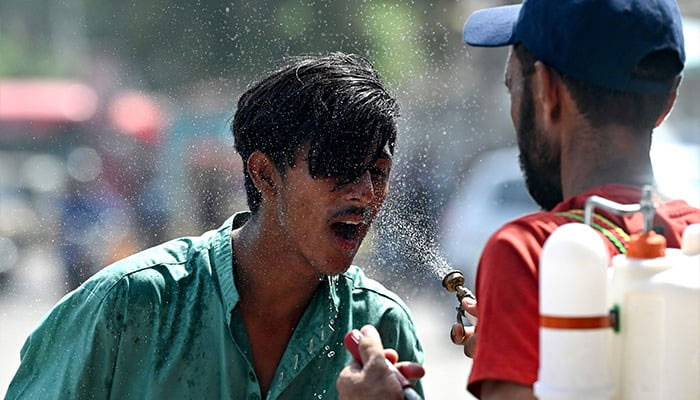Boiling point
Heatwaves have made their second appearance in Lahore, where the temperature rose to 43.3 degrees C on Monday
Since Sunday, at least 27 unclaimed bodies have been found in different areas of Karachi. According to Edhi Foundation, the dead included drug addicts, and while it is normal to find two-three dead bodies every day, the surge in the number is likely due to extreme temperatures in the city, which is currently in the grip of heatwaves. This condition is not restricted to Karachi. Heatwaves have made their second appearance in Lahore, where the temperature rose to 43.3 degrees C on Monday. In Balochistan, hot weather conditions have created many problems for residents. In Turbat alone, the mercury reached 48 degrees C.
The government has been repeatedly told that it should set up relief camps for people. These spots help the helpless get the vital aid they need to keep their bodies hydrated and get some respite. Social media is full of images of people sitting near bank ATM kiosks to feel the cold wind coming out from the small gaps in the glass door. The 27 people who lost their lives cannot come back, but the government can save hundreds of other such people by setting up camps at bus stands and traffic signals. Temporary rest spaces should be made to allow people to escape the heat. We say that natural disasters do not discriminate, but in a country where inequalities are everywhere, the already burdened people are more likely to face the extreme effects of climate-induced catastrophes. Amid all this, the behaviour of power supply companies has been dismal. From Karachi to Lahore to many parts of Khyber Pakhtunkhwa, power outages are back. While there are legitimate concerns regarding power theft and lack of payment, perhaps such punishments can wait till after the current heatwave. In the event of a natural disaster, we should chalk out one goal for ourselves: protect as many people as possible regardless of what their life choices are.
There is also a pressing need for long-term strategies to address the underlying factors contributing to these tragedies. Investments in infrastructure, healthcare, and urban planning must consider climate resilience to safeguard communities from future heatwaves. Government agencies, civil society organizations, and citizens must unite in their efforts to protect the most vulnerable and ensure that no one is left behind in the face of such adversity.
-
 Lana Del Rey Announces New Single Co-written With Husband Jeremy Dufrene
Lana Del Rey Announces New Single Co-written With Husband Jeremy Dufrene -
 Ukraine-Russia Talks Heat Up As Zelenskyy Warns Of US Pressure Before Elections
Ukraine-Russia Talks Heat Up As Zelenskyy Warns Of US Pressure Before Elections -
 Lil Nas X Spotted Buying Used Refrigerator After Backlash Over Nude Public Meltdown
Lil Nas X Spotted Buying Used Refrigerator After Backlash Over Nude Public Meltdown -
 Caleb McLaughlin Shares His Resume For This Major Role
Caleb McLaughlin Shares His Resume For This Major Role -
 King Charles Carries With ‘dignity’ As Andrew Lets Down
King Charles Carries With ‘dignity’ As Andrew Lets Down -
 Brooklyn Beckham Covers Up More Tattoos Linked To His Family Amid Rift
Brooklyn Beckham Covers Up More Tattoos Linked To His Family Amid Rift -
 Shamed Andrew Agreed To ‘go Quietly’ If King Protects Daughters
Shamed Andrew Agreed To ‘go Quietly’ If King Protects Daughters -
 Candace Cameron Bure Says She’s Supporting Lori Loughlin After Separation From Mossimo Giannulli
Candace Cameron Bure Says She’s Supporting Lori Loughlin After Separation From Mossimo Giannulli -
 Princess Beatrice, Eugenie Are ‘not Innocent’ In Epstein Drama
Princess Beatrice, Eugenie Are ‘not Innocent’ In Epstein Drama -
 Reese Witherspoon Goes 'boss' Mode On 'Legally Blonde' Prequel
Reese Witherspoon Goes 'boss' Mode On 'Legally Blonde' Prequel -
 Chris Hemsworth And Elsa Pataky Open Up About Raising Their Three Children In Australia
Chris Hemsworth And Elsa Pataky Open Up About Raising Their Three Children In Australia -
 Record Set Straight On King Charles’ Reason For Financially Supporting Andrew And Not Harry
Record Set Straight On King Charles’ Reason For Financially Supporting Andrew And Not Harry -
 Michael Douglas Breaks Silence On Jack Nicholson's Constant Teasing
Michael Douglas Breaks Silence On Jack Nicholson's Constant Teasing -
 How Prince Edward Was ‘bullied’ By Brother Andrew Mountbatten Windsor
How Prince Edward Was ‘bullied’ By Brother Andrew Mountbatten Windsor -
 'Kryptonite' Singer Brad Arnold Loses Battle With Cancer
'Kryptonite' Singer Brad Arnold Loses Battle With Cancer -
 Gabourey Sidibe Gets Candid About Balancing Motherhood And Career
Gabourey Sidibe Gets Candid About Balancing Motherhood And Career




